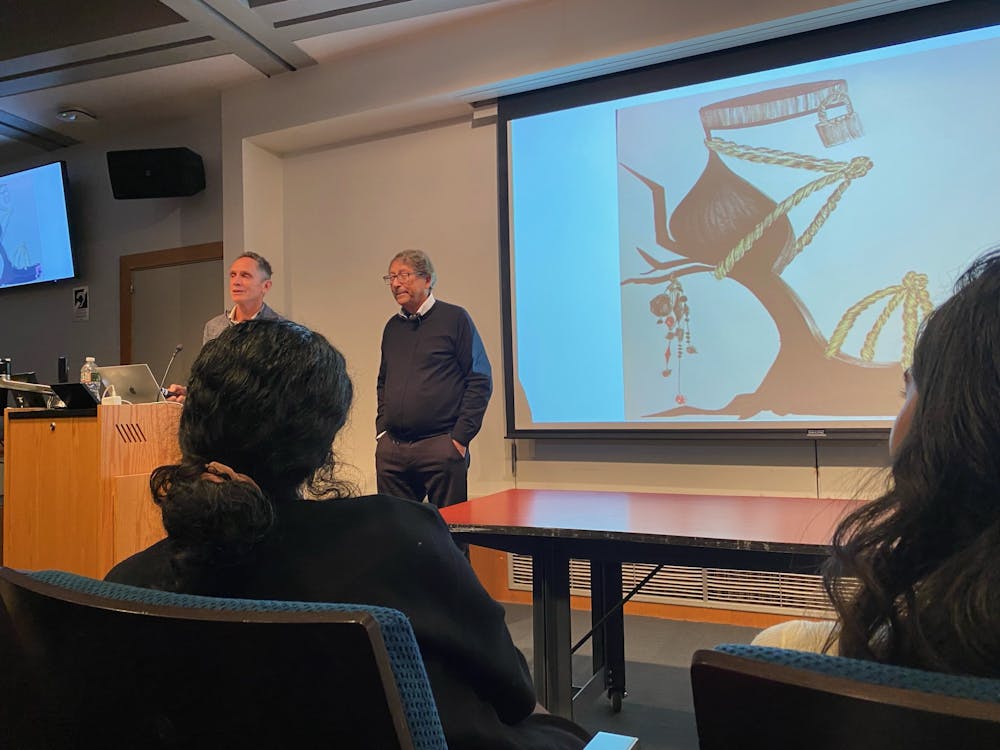On Nov. 16, The Princeton Entrepreneurship Council hosted Stuart Weitzman, the founder of the luxury footwear brand bearing his name, to talk about his entrepreneurial journey, or in his words, “the road less traveled.”
Weitzman is an alumnus of the Wharton School at the University of Pennsylvania and has designed for celebrities including Aretha Franklin, Diablo Cody, and Laura Harring in his career. He discussed his experience taking risks, starting off in the industry, and giving back with his shoes.
Weitzman introduced his story as originating with one principle: risk.
He described another artist, Andy Warhol, as a famous example of a risk taker, “who created art not just on the road less traveled, but never traveled.” Weitzman added that despite Warhol’s first few miserable years as an artist, “his risk paid off.” At the beginning of his career, Weitzman designed shoes for free, specifically for celebrities — a business move that Weitzman categorized as a risk.
“I had a little bit of capital saved working elsewhere and I took a third of that capital to set up a little factory that can make shoes one pair at a time to give away to the celebrities,” he said.
Reflecting on his undergraduate education, Weitzman noted that if any professor from Wharton had heard about his plans of using his savings for making a product that “nobody is going to pay for,” he wouldn’t have been able to graduate.
However, when Aretha Franklin wore a pair of his shoes for the Grammys and thanked Weitzman personally on stage for making the “beautiful and comfortable shoes,” the risk paid off.
Comfort is a defining quality of Weitzman’s products. In designing his signature shoes, he said he drew inspiration from non-competitor long-standing brands produced on a mass scale. One example is the Stuart Weitzman gladiator sandals — modeled by Kate Moss — which were inspired by Teva hiking sandals, popular among women for their comfort and look.

“I made the gladiator sandals not just for fashion but also for function,” he said. “The gladiator shoes had all elastic back stripes and had a tiny zipper, so you don’t have to fuss to get it on you.”
Shortly after, the shoe became the “it sandals” of Europe and the United States.
For Weitzman, inspiration also came from the visual arts. His 2016 campaign starring Gigi Hadid, Joan Smalls, and Lily Aldridge embracing each other, completely naked except for Stuart Weitzman heels, was inspired by “The Three Graces” sculpture by Antonio Canova. The campaign won him and photographer Mario Testino the Clio Fashion and Beauty Award in the same year.
Weitzman added that the campaign also received great attention from fashion magazines and brought publicity, saying, “When you bring culture and art into another field, the editors love it and write about it.”

Besides his muses, he said that he owed his success partly to starting the business by working for another company. Before starting his own line, Weitzman worked at Seymour Shoes, owned by his father Seymour Weitzman. Later the label was sold to a Spanish company, but Weitzman continued to design shoes for the label. Being an employee gave Weitzman the experience to start his own brand.
“I learned who the best retailers in America were. I learned about the best suppliers. They made a lot of mistakes. I never made the same mistake. It was all at their cost,” he said.
With these lessons, and a group of three people who helped Weitzman start the company, he opened Stuart Weitzman shoes. To the future entrepreneurs of Princeton, he said, “You can’t do it alone.”
Weitzman also talked about the importance of giving back to the community as an entrepreneur.
During the talk, he showed a short clip of Gigi Hadid presenting the “Gigi Mule” on the Jimmy Fallon show. The suede mules were designed by Stuart Weitzman and Gigi Hadid for the charity campaign “Look Good, Do Good.” The campaign’s mission was to help build schools in Ghana, Guatemala, and Laos in collaboration with Pencils of Promise.
The event was held on Wednesday, Nov. 16, in Betts Auditorium from 4:30–6:30 p.m.
Kayra Sener is a news contributor for The Daily Princetonian. Please direct any corrections requests to corrections at dailyprincetonian.com.








